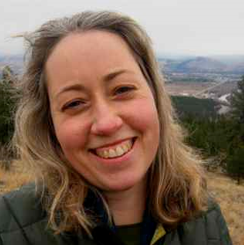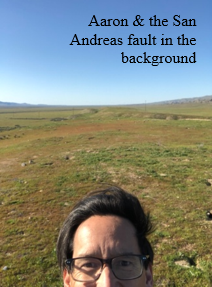Robinson Jeffers, U2, & Popular Culture
End of Summer, 2023
Greetings Members of the RJA,
As summer 2023 draws to a close, I’d like to revisit the summer of 2017. That summer, more than half a century after Jeffers’s death, an iconic rock band was on a worldwide tour that reached three million fans on five continents. The band, U2, prefaced their sold-out  stadium performances with a selection of poetry for the audience prior to the start of the concert, and Jeffers’ “Juan Higera Creek” was one of several chosen by the band (bottom right). It’s important to note that U2 are counted among the most successful bands of the late twentieth century and, like Jeffers, have graced the cover of Time magazine.
stadium performances with a selection of poetry for the audience prior to the start of the concert, and Jeffers’ “Juan Higera Creek” was one of several chosen by the band (bottom right). It’s important to note that U2 are counted among the most successful bands of the late twentieth century and, like Jeffers, have graced the cover of Time magazine.
Juan Higera Creek
Neither your face, Higera, nor your deeds
Are known to me; and death these many years
Retains you, under grass or forest-mould.
Only a rivulet bears your name: it runs
Deep-hidden in undeciduous redwood shade
And trunks by age made holy, streaming down 
A valley of the Santa Lucian hills.
There have I stopped, and though the unclouded sun
Flew high in loftiest heaven, no dapple of light
Flecked the large trunks below the leaves intense,
Nor flickered on your creek: murmuring it sought
The River of the South, which oceanward
Would sweep it down. I drank sweet water there,
And blessed your immortality. Not bronze,
Higera, nor yet marble cool the thirst;
Let bronze and marble of the rich and proud
Secure the names; your monument will last
Longer, of living water forest-pure. (CP, v. 4).
In the context of such global rock stardom, the choice of “Juan Higera Creek” might seem discordant in a milieu where immortality is measured in the modern currency of sell-out crowds and monuments of gold records and Grammy awards. But U2’s choice of a Jeffers poem, I argue, reflects a growing cultural movement toward simplicity and simplified lifestyles. In the current vernacular it’s called “minimalism” or “voluntary simplicity.” Who better to demonstrate an austere lifestyle of art, science, intellectualism, religion, passivity, and reflection than the constellation of Jeffers, Una, the twins, and Tor House and Hawk.
U2’s choice of Jeffers’s poem speaks to this movement and demonstrates the synergy between our current moment in popular culture and Jeffers’s oeuvre. Indeed, as a member of the generation born immediately following Jeffers’s death, a person on the surface perhaps more firmly rooted in the cultural landscape of 1980’s rock than 1920’s poetry, I think the U2 story I’ve just recounted illustrates one of several possible synergies between Robinson Jeffers and our popular culture, synergies which give us opportunities to begin the conversation of popularizing the poetry and life of Robinson Jeffers.
The environmental movement is clearly another point of confluence between Jeffers’s poetry and popular culture. Since 1965 and the publication of the Sierra Club’s Not Man Apart, his poetry has been used as prophecy and solution for the environmental changes that are becoming increasingly apparent. Few authors evoke the terrible grandeur of nature and the miniscule scale, yet existential necessity, of humans to fully comprehend the universe like Jeffers. As Carl Sagan wrote, “we [humans] are the sense organ of the universe”, and few artists better articulated the beauty, pain, and suffering of the human-lived world than Jeffers.
From a letter Jeffers wrote to Sister Mary James Power, 1 October, 1934, CL, v. 2): 
I believe that the universe is one being, all its parts are different expressions of the same energy, and they are all in communication with each other, influencing each other, therefore parts of one organic whole (This is physics, I believe, as well as religion.) The parts change and pass, or die, people and races and rocks and stars; none of them seems to me important in itself, but only the whole. This whole is in all its parts so beautiful, and is felt by me to be so intensely in earnest, that I am compelled to love it, and to think of it as divine. It seems to me that this whole alone is worthy of the deeper sort of love; and that there is peace, freedom, I might say a kind of salvation, in turning one’s affections outward toward this one God, rather than inward on one’s self, or on humanity, or on human imaginations, and abstractions – the world of spirits. …I think that one may contribute (ever so slightly) to the beauty of things by making one’s own life and environment beautiful, so far as one’s power reaches.
Isn’t this a good time for humanity to be re-introduced to a little bit of humility through the careful curation and presentation of Jeffers’ best works so to contribute to “the beauty of things”?
And finally, every time I introduce a student, colleague, friend, or stranger to Jeffers, they become absorbed and flabbergasted, and exclaim: “How did I never read him?!” “His poems are so timeless!”, “He is truly an environmental prophet!”. My canvasing of people across the country and continents, when mentioning Jeffers and his achievement, indicates that they are hungry for his art and lifestyle. Shouldn’t his books be more available, more read? Shouldn’t Tor House be mentioned in the same breath as the Mark Twain House or Fallingwater, recognized as quickly as Dostoevsky’s desk or Yeats tower?
So, I ask you to ponder the following: If a hugely successful rock band projects Jeffers’ verse onto the screen every night during a global tour, thus demonstrating the possibility for the continued relevance of poetry in our popular culture, how might we, as a community dedicated to Jeffers, translate this action in terms of deepening the general populations’ knowledge and appreciation of Jeffers’ prophetic verse and aesthetic life?
Over the past year the RJA has begun to re-evaluate its role in the promotion and maintenance of Jeffers’ literary achievement in the academy. Thanks to Executive Director Tim Hunt’s initiative, we have expanded the programming of the Association to reach beyond the traditional halls of academic scholars and to begin curating resources to promote the literary achievement of Robinson Jeffers to a wider population. Such programming includes regular “book group meetings” where members may discuss various poems; webinars that feature new study or presentation from the Jeffers canon, and the creation of a newly designed open-source and on-line version of Jeffers Studies, as well as a new mode of Annual RJA conferences. Look for future announcements regarding these initiatives.
But this is simply not enough. In the 21st century a vast array of multi-media outlets play the dominant role in shaping public perceptions.  It is in our best interests to promulgate the lifestyle and poems of Robinson Jeffers, “ever so slightly”, to make sure that he remains relevant to the modern movements of artistry and to earnestly improve the world around us. What if each of us donated a copy of The Wild God of the World to a local high school or library or random, but possibly interested, stranger? What if we regularly posted images and poems of beauty in our social media? A lovely Instagram account “Poetry is Not a Luxury,” (@poetryisnotaluxury; right), a title that refers to Audre Lord’s seminal 1977 essay, has over 750,000 followers. The account simply posts a stanza or a whole poem every day, including the work of Rainer Maria Rilke, Jane Hirshfield, Emily Dickinson, and many others; a sure sign of the continued relevance of the role of poetry in sustaining our popular culture. How else might we imagine and innovate new ways to bring Robinson Jeffers to the forefront of the public dialog on art, politics, culture and science? Certainly, we may begin by saturating our local worlds with images, verses, and actions that are Jeffersian. Let’s follow on the example of rockstars and social media influencers as far as our powers may reach to demonstrate that this is the moment for America to become reacquainted with Robinson Jeffers.
It is in our best interests to promulgate the lifestyle and poems of Robinson Jeffers, “ever so slightly”, to make sure that he remains relevant to the modern movements of artistry and to earnestly improve the world around us. What if each of us donated a copy of The Wild God of the World to a local high school or library or random, but possibly interested, stranger? What if we regularly posted images and poems of beauty in our social media? A lovely Instagram account “Poetry is Not a Luxury,” (@poetryisnotaluxury; right), a title that refers to Audre Lord’s seminal 1977 essay, has over 750,000 followers. The account simply posts a stanza or a whole poem every day, including the work of Rainer Maria Rilke, Jane Hirshfield, Emily Dickinson, and many others; a sure sign of the continued relevance of the role of poetry in sustaining our popular culture. How else might we imagine and innovate new ways to bring Robinson Jeffers to the forefront of the public dialog on art, politics, culture and science? Certainly, we may begin by saturating our local worlds with images, verses, and actions that are Jeffersian. Let’s follow on the example of rockstars and social media influencers as far as our powers may reach to demonstrate that this is the moment for America to become reacquainted with Robinson Jeffers.
Sincerely,
Aaron Yoshinobu
President, Robinson Jeffers Association
P.S. Special thanks to Dr. Laura diZerega for the photograph from U2’s show at the Olympia Stadion, Berlin, on 12 July, 2017, depicting Zabriskie Point above the stage, and poet Clarissa Aykroyd’s blog, The Stone and the Star, for the image of Juan Higera Creek projected next to the stage.

 We all are well acquainted with Jim’s erudite
We all are well acquainted with Jim’s erudite  In that vein, I would like to formally introduce Emeritus Professor Tim Hunt as our new executive director. If I need to introduce Tim to the RJA membership, then we may have a problem at the very core of our mission! After editing four volumes of
In that vein, I would like to formally introduce Emeritus Professor Tim Hunt as our new executive director. If I need to introduce Tim to the RJA membership, then we may have a problem at the very core of our mission! After editing four volumes of  The final addition to our leadership team is the election of new Advisory Board member, Louise Economides, who will join existing members Robert Zaller and Gere diZerega. Louise is a professor of literature at the University of Montana, where she focuses on the intersection of environmental studies and the humanities. Louise has written on “
The final addition to our leadership team is the election of new Advisory Board member, Louise Economides, who will join existing members Robert Zaller and Gere diZerega. Louise is a professor of literature at the University of Montana, where she focuses on the intersection of environmental studies and the humanities. Louise has written on “ “Civilization exists by geologic consent, subject to change without notice.” This quote, often attributed to Will Durant, contextualizes our modern condition and allows us to recognize the fragile connection between the environment and the culture—civilization—through which we interpret our existence. If we include the organic changes that arise from evolutionary biology in the broader context of Earth evolution, we might consider “biological consent” as equally subject to change without notice (read: viruses). Our existence has always been subconsciously predicated on the notion of earthly and biological stability. Yet here we are, amidst a global pandemic, the recent eruption of Hunga Tonga (right), and natural and anthropogenic climate change. We are faced with geologic phenomena that would find a fitting home in the poetry of
“Civilization exists by geologic consent, subject to change without notice.” This quote, often attributed to Will Durant, contextualizes our modern condition and allows us to recognize the fragile connection between the environment and the culture—civilization—through which we interpret our existence. If we include the organic changes that arise from evolutionary biology in the broader context of Earth evolution, we might consider “biological consent” as equally subject to change without notice (read: viruses). Our existence has always been subconsciously predicated on the notion of earthly and biological stability. Yet here we are, amidst a global pandemic, the recent eruption of Hunga Tonga (right), and natural and anthropogenic climate change. We are faced with geologic phenomena that would find a fitting home in the poetry of  I have no definitive answers for these questions, but there are many possibilities waiting to be explored. I look forward to working with all of you to increase and sustain the influence of
I have no definitive answers for these questions, but there are many possibilities waiting to be explored. I look forward to working with all of you to increase and sustain the influence of